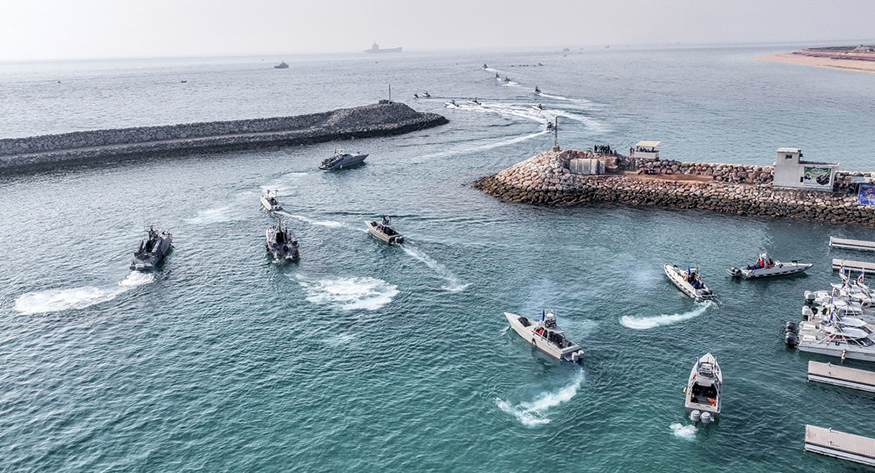The Islamic Revolutionary Guard Corps (IRGC) announced on Wednesday it was conducting a military maneuver on the UAE-occupied islands of Greater and Lesser Tunbs and Abu Musa, dubbing it the “Martyr Brigadier General Ishaq Dara” maneuver.
The exercises, according to the official Iranian news agency IRNA, were primarily focused on Abu Musa Island, but the IRGC also deployed forces to Greater Tunb Island, noting that ships, drones, and missile units participated in the drill. In his statements on the maneuver, Brigadier General Abolfazl Shekarchi, the spokesman for the Iranian General Staff, subtly threatened the countries in the region, saying: “The avaricious need to get a glimpse of our arsenal so that they avoid making a mistake in their calculations.”
In typical Iranian fashion, however, he intended to pack the maneuver and his words with multiple messages. Speaking to Tasnim News Agency, he explained that the maneuver that took place close to the Strait of Hormuz was intended to send a message to the countries in the area about the need to stop depending on outsiders for security. He urged these countries to strengthen their relationship with Iran and promised them that if this occurred, security would be established in the waters of the Arabian Gulf.
In response, the United States immediately dispatched the amphibious assault ship USS-Bataan and the landing ship USS Carter Hall, with over 3,000 US Marines aboard. This remarkable action may have a number of implications, chief among them being the protection of this strategic shipping route from the potential for regional conflict that could disrupt 20 percent of the world’s oil trade and affect the stability of already high oil prices due to the Russian-Ukrainian war.
Despite the significance of this step, the United States did not stop there. There were many messages sent to various parties in and outside the region. Indeed, Washington’s step represented a reversal from its previously announced strategic direction, which prioritized interest in the East Asian region at the expense of reducing attention and involvement in the Middle East region’s problems.
The first US message was sent to its Gulf allies in an effort to mend relations and rebuild trust that had recently been severely damaged by the United States’ declining interest in the Middle East, which they found to be inconsistent with their needs for security in Gulf waters, let alone other issues where the US took a stance on gray areas, which made it possible for other global powers to take advantage of this retreat and access previously inaccessible areas.
The second message was unmistakably meant for China, the most worrisome of the world’s superpowers to the United States in light of China’s diplomatic success in serving as a diplomatic intermediary between Saudi Arabia and Iran. There is potential for this Chinese role to expand in the future to include joint military and security mediation between the two countries or between the countries on either side of the Gulf, as a wager on its future relations with Iran and a means of putting an end to the legacy of the United States, which voluntarily declared indifference to the worries of the nations in that region.
Some believe the American election has a bearing on this US action, since the current democratic administration, which plans to run for president, will enter the presidential race without making much progress on the Iranian nuclear issue. Notably, the previous Republican administration abandoned the nuclear deal while highlighting the futility of negotiations with Tehran. The Joe Biden administration believes that this file will inevitably represent weaknesses that the Republicans will exploit, which is what prompted him to make such a snap decision before the presidential election campaign begins at the beginning of next year.
The US military buildup undoubtedly heats the Gulf waters, particularly after the US military disclosed that it is considering sending Marines to sail on board commercial ships and oil tankers passing through the Strait of Hormuz. Although it is an unprecedented action, the Pentagon wants to stop Iran from capturing, bothering, or crippling civilian vessels. Prior to this, in response to Iran’s detention and harassment of commercial cargo ships, the Pentagon sent additional F-35 and F-16 fighter jets and a warship to the Middle East to monitor the region’s major waterways.
In recent years, the US military has documented a number of incidents in which Iran was actually involved. During the past two years alone, Iran has been reported to have detained or attempted to seize close to 25 ships of various nationalities in the region. Possibly the most heated moments in the ongoing conflict between the United States and Iran occurred in 2019, when a series of attacks on cargo ships in Gulf waters sparked a conflict known as the “tanker war”.
At the time, Tehran claimed that both the United States and the United Kingdom were attempting to forcibly seize Iranian oil under the guise of carrying out sanctions that Tehran does not recognize. Since then, the conflict over the Arabian Gulf and its surrounding waters has escalated at regular intervals for a wide range of reasons. Each side has its own goals as well as general concerns about navigational security, as was the case last July, which may have served as a harbinger of the current situation. After the United States declared on 5 August that its forces had prevented two Iranian attempts to seize commercial tankers in international waters off Oman, Iran seized a ship the following day.
In light of analogous earlier chapters, the current escalation in tensions between the United States and Iran may seem deliberate and unlikely to spiral out of control. However, this time, their motivations might outweigh their common sense, and a decline seems more likely than ever before, in light of an atmosphere far more volatile than that which is necessary for pacification.













